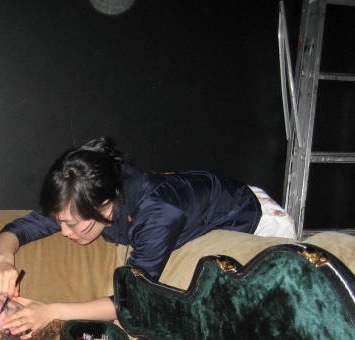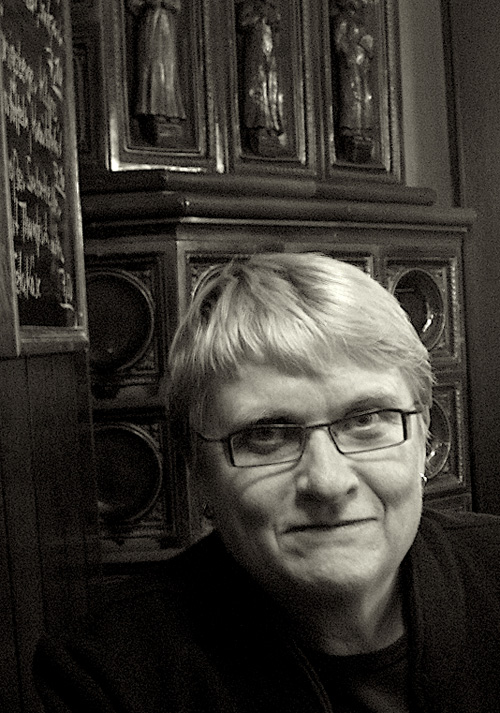Misbah Khokhar

 Misbah Khokhar was born in Karachi-Pakistan, with both European and Indian ancestry. She currently lives in Melbourne. She holds a Masters in Philosophy in Creative Writing from the University of Queensland. Her work appears in Australian Poetry Journal, Cordite, Contemporary Asian Australian Poets and Peril. She has been featured on ABC Radio’s Poetica, and has performed at the Queensland Poetry Festival. She was highly commended by Thomas Shapcott, Brownyn Lea and John Kinsella, and mentioned as a ‘standout’ in Lea’s essay ‘Australian Poetry Now’ (Poetry Magazine, May 2016, Ed. Robert Adamson). Her debut collection Rooftops in Karachi is published with Vagabond deciBels3.
Misbah Khokhar was born in Karachi-Pakistan, with both European and Indian ancestry. She currently lives in Melbourne. She holds a Masters in Philosophy in Creative Writing from the University of Queensland. Her work appears in Australian Poetry Journal, Cordite, Contemporary Asian Australian Poets and Peril. She has been featured on ABC Radio’s Poetica, and has performed at the Queensland Poetry Festival. She was highly commended by Thomas Shapcott, Brownyn Lea and John Kinsella, and mentioned as a ‘standout’ in Lea’s essay ‘Australian Poetry Now’ (Poetry Magazine, May 2016, Ed. Robert Adamson). Her debut collection Rooftops in Karachi is published with Vagabond deciBels3.
Rooftops in Karachi
My cousin has named all of his homing pigeons. He takes them in his soft hands and feeds them, but I have a feeling he could just as easily use those hands to snap their thin necks. My other cousin, who lives in the same house, goes around shooting cats. Since I arrived I have been putting out bowls of milk each night. Another cousin has an imaginary lover who she has introduced me to. She makes him out to be so real that I believe he is. But I can never seem to see him, which is not due to him being imaginary, but because he is shy and agile. She describes the way he kisses her, and the conversations they have, and to this day I remember his name. I know it’s been said that falconers feel their hearts soar with their falcons, but I don’t think it’s just a feeling.
I’m Going to Give You a Photograph
And when I take the photograph you will be saved. From what I don’t know. I’ve given you a photograph where you can store your grief: let it leave your face, ignite and fade. I’ve given you a photograph, your spectral resin will have no copies. It will be your canoptic surface, a scale of the immensity of your beauty. The flash will burn away your fate, will make you momentarily famous. I will give you a photograph that will be your golden fleece, a replica that answers you in time with a little betrayal.

 Brendan Ryan has had three collections of poetry published, the most recent being A Tight Circle, Whitmore Press, in 2008. His next collection of poetry, Travelling Through the Family, will be published by Hunter Publishers in 2012.
Brendan Ryan has had three collections of poetry published, the most recent being A Tight Circle, Whitmore Press, in 2008. His next collection of poetry, Travelling Through the Family, will be published by Hunter Publishers in 2012. Jen Crawford is a New Zealander living in Singapore. Her poetry collections include Bad Appendix (Titus Books), Napoleon Swings (Soapbox Press) and most recently, Pop Riveter, a set of factory poems available in limited edition from Pania Press. She teaches creative writing at Nanyang Technological University.
Jen Crawford is a New Zealander living in Singapore. Her poetry collections include Bad Appendix (Titus Books), Napoleon Swings (Soapbox Press) and most recently, Pop Riveter, a set of factory poems available in limited edition from Pania Press. She teaches creative writing at Nanyang Technological University. Julie Chevalier’s short-story collection, Permission to Lie, was published by Spineless Wonders in 2011. Two poetry collections are forthcoming from Puncher & Wattmann: linen tough as history, and Darger: his girls.
Julie Chevalier’s short-story collection, Permission to Lie, was published by Spineless Wonders in 2011. Two poetry collections are forthcoming from Puncher & Wattmann: linen tough as history, and Darger: his girls.
 Michael Farrell has previously published prose poems in a raiders guide (Giramondo 2008). He coedited (with Jill Jones) Out of the Box: Contemporary Australian Gay and Lesbian Poets (Puncher and Wattmann 2009). His latest publication is thempark (Book Thug 2010). Contact:
Michael Farrell has previously published prose poems in a raiders guide (Giramondo 2008). He coedited (with Jill Jones) Out of the Box: Contemporary Australian Gay and Lesbian Poets (Puncher and Wattmann 2009). His latest publication is thempark (Book Thug 2010). Contact:  Kirby Wright was born and raised in Honolulu, Hawaii. He is a graduate of Punahou School in Honolulu and the University of California at San Diego. He received his MFA in Creative Writing from San Francisco State University. Wright has been nominated for two Pushcart Prizes and is a past recipient of the Ann Fields Poetry Prize, the Academy of American Poets Award, The Browning Society Award for Dramatic Monologue, and Arts Council Silicon Valley Fellowships in Poetry and The Novel. BEFORE THE CITY, his first book of poetry, took First Place at the 2003 San Diego Book Awards. Wright is also the author of the companion novels PUNAHOU BLUES and MOLOKA’I NUI AHINA, both set in Hawaii. He was a Visiting Writer at the 2009 International Writers Conference in Hong Kong, where he represented the Pacific Rim region of Hawaii and lectured with poet Gary Snyder. He was a Visiting Writer at the 2010 Martha’s Vineyard Writers Residency in Edgartown, Mass., and also the 2011 Artist in Residence at Milkwood International, Czech Republic.
Kirby Wright was born and raised in Honolulu, Hawaii. He is a graduate of Punahou School in Honolulu and the University of California at San Diego. He received his MFA in Creative Writing from San Francisco State University. Wright has been nominated for two Pushcart Prizes and is a past recipient of the Ann Fields Poetry Prize, the Academy of American Poets Award, The Browning Society Award for Dramatic Monologue, and Arts Council Silicon Valley Fellowships in Poetry and The Novel. BEFORE THE CITY, his first book of poetry, took First Place at the 2003 San Diego Book Awards. Wright is also the author of the companion novels PUNAHOU BLUES and MOLOKA’I NUI AHINA, both set in Hawaii. He was a Visiting Writer at the 2009 International Writers Conference in Hong Kong, where he represented the Pacific Rim region of Hawaii and lectured with poet Gary Snyder. He was a Visiting Writer at the 2010 Martha’s Vineyard Writers Residency in Edgartown, Mass., and also the 2011 Artist in Residence at Milkwood International, Czech Republic. Jill Jones has published six full-length books of poetry, including Dark Bright Doors, which was shortlisted for the 2011 Kenneth Slessor Prize. She co-edited, with Michael Farrell,Out Of the Box: Contemporary Australian Gay and Lesbian Poets. She is a member of the J. M. Coetzee Centre for Creative Practice at the University of Adelaide.
Jill Jones has published six full-length books of poetry, including Dark Bright Doors, which was shortlisted for the 2011 Kenneth Slessor Prize. She co-edited, with Michael Farrell,Out Of the Box: Contemporary Australian Gay and Lesbian Poets. She is a member of the J. M. Coetzee Centre for Creative Practice at the University of Adelaide. Ivy Ireland is a part-time cabaret performer, creative writing tutor, harpist, magician’s assistant, and PhD candidate. Ivy was awarded the 2007 Australian Young Poet Fellowship, and has had her poems published in various literary magazines and anthologies. Ivy’s first solo poetry publication came out in 2007 and is entitled Incidental Complications.
Ivy Ireland is a part-time cabaret performer, creative writing tutor, harpist, magician’s assistant, and PhD candidate. Ivy was awarded the 2007 Australian Young Poet Fellowship, and has had her poems published in various literary magazines and anthologies. Ivy’s first solo poetry publication came out in 2007 and is entitled Incidental Complications.